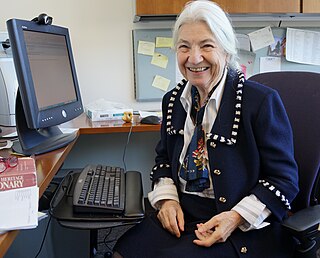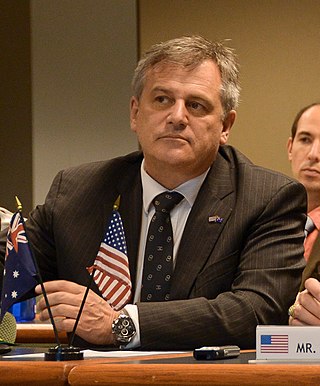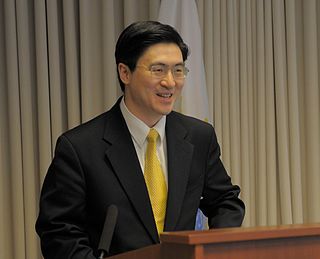Santa Clara University School of Engineering was founded and began offering bachelor's degrees in 1912. Over the next century, as the Santa Clara Valley transformed from a largely agricultural area to an industrial center, the school added master and doctoral programs designed to meet the area's growing need for expert engineers. Today, the Silicon Valley provides a setting for the school's programs offered through a broad range of departments.
Hugh Francis Durrant-Whyte is a British-Australian engineer and academic. He is known for his pioneering work on probabilistic methods for robotics. The algorithms developed in his group since the early 1990s permit autonomous vehicles to deal with uncertainty and to localize themselves despite noisy sensor readings using simultaneous localization and mapping (SLAM).

Eduardo Daniel Sontag is an Argentine-American mathematician, and distinguished university professor at Northeastern University, who works in the fields control theory, dynamical systems, systems molecular biology, cancer and immunology, theoretical computer science, neural networks, and computational biology.

Brian David Outram Anderson is Professor in the Research School of Information Sciences and Engineering at the Australian National University. His research interests include circuits, signal processing and control, and his current work focuses on distributed control of multi-agent systems, sensor network localization, adaptive and non-linear control. Professor Anderson served as President of the Australian Academy of Science from 1998 to 2002.

Manuela Maria Veloso is the Head of J.P. Morgan AI Research & Herbert A. Simon University Professor Emeritus in the School of Computer Science at Carnegie Mellon University, where she was previously Head of the Machine Learning Department. She served as president of Association for the Advancement of Artificial Intelligence (AAAI) until 2014, and the co-founder and a Past President of the RoboCup Federation. She is a fellow of AAAI, Institute of Electrical and Electronics Engineers (IEEE), American Association for the Advancement of Science (AAAS), and Association for Computing Machinery (ACM). She is an international expert in artificial intelligence and robotics.

Joseph Slepian (February 11, 1891 – December 19, 1969) was an American electrical engineer known for his contributions to the developments of electrical apparatus and theory.

Ruzena Bajcsy is an American engineer and computer scientist who specializes in robotics. She is professor of electrical engineering and computer sciences at the University of California, Berkeley, where she is also director emerita of CITRIS.

Alexander Zelinsky is an Australian computer scientist, systems engineer and roboticist. His career spans innovation, science and technology, research and development, commercial start-ups and education. Professor Zelinsky is Vice-chancellor and President of the University of Newcastle joining the university in November 2018. He was the Chief Defence Scientist of Australia from March 2012 until November 2018. As Chief Defence Scientist he led defence science and technology for Australia's Department of Defence.

Harold Vincent Poor is the Michael Henry Strater University Professor of Electrical Engineering at Princeton University, where he is also the Interim Dean of the School of Engineering and Applied Science. He is a specialist in wireless telecommunications, signal processing and information theory. He has received many honorary degrees and election to national academies. He was also President of IEEE Information Theory Society (1990). He is on the board of directors of the IEEE Foundation.

Mung Chiang is a Chinese-American electrical engineer and academic administrator who has been serving as the current and 13th president of Purdue University since 2023. He is the youngest president of a top-50 American university in recent history, taking office at age 45.
Erdal Arıkan is a Turkish professor in Electrical and Electronics Engineering Department at Bilkent University, Ankara, Turkey. He is known for his invention of polar codes, which is a key component of 5G technologies.
Stephen P. Boyd is an American professor and control theorist. He is the Samsung Professor of Engineering, Professor in Electrical Engineering, and professor by courtesy in Computer Science and Management Science & Engineering at Stanford University. He is also affiliated with Stanford's Institute for Computational and Mathematical Engineering (ICME).
Chung-Chieh Jay Kuo is a Taiwanese electrical engineer and the director of the Multimedia Communications Lab as well as distinguished professor of electrical engineering and computer science at the University of Southern California. He is a specialist in multimedia signal processing, video coding, video quality assessment, machine learning and wireless communication.
Saman Halgamuge was educated in Germany and Sri Lanka and he is currently a Professor of University of Melbourne, Australia. He is an elected Fellow of Institute of Electrical and Electronics Engineers, USA, Institute of Engineering Technology (IET) UK and National Academy of Sciences Sri Lanka (NASSL). He is a highly cited expert in his field and listed as one of the top 2% cited experts for AI and Image Processing in the Stanford University Database published since 2020. His most-cited paper being Self-organizing hierarchical particle swarm optimizer with time-varying acceleration coefficients, with over 4000 citations, according to GoogleScholar. He is a Distinguished Speaker/Lecturer on Computational Intelligence appointed by IEEE. He has supervised 45 PhD scholars to completion and delivered over 60 keynotes at International and national conferences.
Huijun Gao from the Harbin Institute of Technology, Harbin, China was named Fellow of the Institute of Electrical and Electronics Engineers (IEEE) in 2014 for contributions to the theory and industrial applications of networked control systems.
Song Yonghua FREng is a Chinese electrical engineer. He has been rector of the University of Macau since January 2018, and previously served as Executive Vice President at Zhejiang University.
The M. A. Sargent Medal is awarded by Engineers Australia for longstanding eminence in science or the practice of electrical engineering. It is named in honour of Michael Anthony (Mike) Sargent, an outstanding Australian electrical engineer. The medal is the highest award of the Electrical College board of Engineers Australia.
Duan Guangren is a Chinese scientist specializing in control theory.

Wen Gao is a Chinese computer scientist and winners of the CCF Wang Xuan Award etc.. He is the founding director of Peng Cheng Laboratory and the director of Faculty of Information & Engineering Sciences at Peking University. He is the pioneer in audio video coding technologies and standards in China, and has served on the faculty of different universities for over 37 years. He received the National Technology Innovation Awards in 2020, the top award of science and technology in China, for his work in the field of video coding technology.

NDHU College of Science and Engineering is an interdisciplinary school of science and engineering of National Dong Hwa University. Established in 1995, NDHU CSAE was founded with Hsia Yu-Ping, the Chair Professor of Yale University and California Institute of Technology, as Founding Dean, which is the second interdisciplinary school of Science and Engineering in Taiwan.









